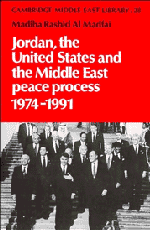Book contents
- Frontmatter
- Contents
- Foreword by William B. Quandt
- Acknowledgements
- Prologue
- 1 Introduction
- 2 Kissinger's legacy and imprint on the Middle East
- Part I Jordan in the Carter Middle East policy
- Part II Jordan in the Reagan Middle East policy
- Part III US, Jordan and Arab approaches to peace
- Appendices
- A Comparison of Middle East peace proposals
- B Jordan–US exchange of questions and answers on the Camp David Accords, September 1978
- C US assistance to Jordan 1975–1989
- D Arab assistance to Jordan paid in accordance with the 1978 Baghdad Summit Conference and 1980 Amman Arab Summit
- E Peres–Hussain Agreement (The London Document), 11 April 1987
- F Shamir's Four-point plan, April 1989
- G Baker's Five-point plan, December 1989
- H Invitation to Madrid Peace Conference, 18 October 1991
- I Letter of Assurances to the Palestinians, 18 October 1991
- Notes
- Select bibliography
- Index
- Cambridge Middle East Library
I - Letter of Assurances to the Palestinians, 18 October 1991
Published online by Cambridge University Press: 25 February 2010
- Frontmatter
- Contents
- Foreword by William B. Quandt
- Acknowledgements
- Prologue
- 1 Introduction
- 2 Kissinger's legacy and imprint on the Middle East
- Part I Jordan in the Carter Middle East policy
- Part II Jordan in the Reagan Middle East policy
- Part III US, Jordan and Arab approaches to peace
- Appendices
- A Comparison of Middle East peace proposals
- B Jordan–US exchange of questions and answers on the Camp David Accords, September 1978
- C US assistance to Jordan 1975–1989
- D Arab assistance to Jordan paid in accordance with the 1978 Baghdad Summit Conference and 1980 Amman Arab Summit
- E Peres–Hussain Agreement (The London Document), 11 April 1987
- F Shamir's Four-point plan, April 1989
- G Baker's Five-point plan, December 1989
- H Invitation to Madrid Peace Conference, 18 October 1991
- I Letter of Assurances to the Palestinians, 18 October 1991
- Notes
- Select bibliography
- Index
- Cambridge Middle East Library
Summary
The Palestinian decision to attend a peace conference to launch direct negotiations with Israel represents an important step in the search for a comprehensive, just and lasting peace in the region. The United States has long believed that Palestinian participation is critical to the success of our efforts.
In the context of the process on which we are embarking, we want to respond to your request for certain assurances related to this process. These assurances constitute US understandings and intentions concerning the conference and ensuing negotiations.
These assurances are consistent with United States policy and do not undermine or contradict United Nations Security Council Resolutions 242 and 338. Moreover, there will be no assurances provided to one party that are not known to all the others. By this we can foster a sense of confidence and minimize chances for misunderstandings.
As President Bush stated in his March 6, 1991 address to Congress, the United States continues to believe firmly that a comprehensive peace must be grounded in United Nations Security Council Resolutions 242 and 338 and the principle of territory for peace. Such an outcome must also provide for security and recognition for all states in the region, including Israel, and for legitimate political rights of the Palestinian people. Anything else, the President noted, would fail the twin tests of fairness and security.
The process we are trying to create offers Palestinians a way to achieve these objectives. The United States believes that there should be an end to the Israeli occupation which can occur only through genuine and meaningful negotiations.
- Type
- Chapter
- Information
- Publisher: Cambridge University PressPrint publication year: 1993

